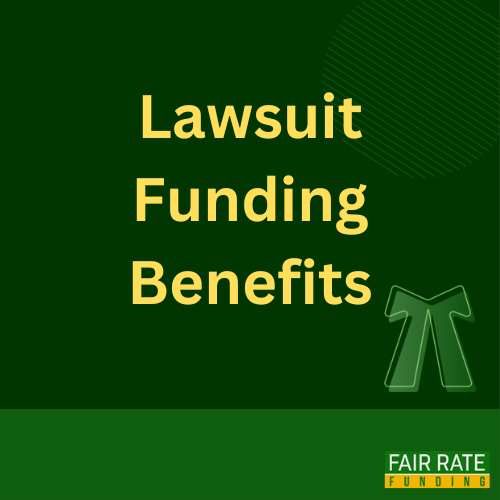Understanding the Benefits of Lawsuit Loans
Lawsuit settlement funding advances cash now to help plaintiffs financially endure the litigation process, reject “low ball” settlement offers and receive larger settlements.
During a lawsuit, the plaintiff’s attorney will introduce the idea of settlement. What this means, is that the two parties, plaintiff and defendant, agree to a fixed amount of compensation in return for a dismissal of the case. Most plaintiffs believe when they enter into a lawsuit, the case will be “tried” before a judge and jury. The reality is that less that 10% of filed lawsuits ever make it to that stage. The vast majority of lawsuits are settled.

Plaintiffs sometimes resist the idea of settlement initially because they want their day in court either to prove what happened to them or demand justice or both. As we will discuss below, lawsuits are an economic endeavor. In other words, there are costs associated with pursuing a lawsuit. These costs make settlement even more likely as we shall see.
Most people do not consider the costs of filing a lawsuit. Many may not even be aware that some of the costs even exist. This is most likely due to the fact that many plaintiffs retain attorneys who pay the upfront costs of litigation.
Once the lawsuit commences or at the very least at the end of the case when the recovery is disbursed, plaintiffs will learn every professional involved in the case must be paid. This includes costs associated not only with lawyers’ fees but also: experts, process servers, court reporters, videographers and even couriers. Charges for filing court cases and documents can reach thousands of dollars in certain extreme instances. Most of these costs are paid in anticipation of a trial which statistics show will likely never occur. Good attorneys attempt to keep these costs to a minimum. They understand even though expenses are part of providing legal services, the costs must be paid from the client’s bottom line.
Lawyers on both sides understand settlement is in everyone’s best interest. Not only is the lawsuit settlement amount agreed upon, but no further expenses must be spent on the case. The alternative is letting a pool of strangers (jury) decide the case. Both parties know from experience that going to a jury is always a risky proposition.
When both sides agree to a number, a settlement agreement can be created. This may cover medical expenses, loss of income and loss of enjoyment of life. But aside from money, plaintiffs are often looking for something else. It may be an apology, getting back something that was taken from them or even having the other side admit they did something wrong. When these contingencies are met and the price is right, the legally binding lawsuit settlement agreement can be the best way to conclude the case.
Far too often however, settlement does not happen in a timely fashion – at least as far as the plaintiff is concerned. And as expenses rise, plaintiffs may find the bills are becoming unmanageable. They may not have enough money to make ends meet, but they and their attorneys are confident in their chances of winning the case.
At this point, Fair Rate Funding can help. Whether awaiting money from a settlement or a verdict, Fair Rate Funding provides a lawsuit settlement funding to those who qualify.
Lawsuit settlement funding makes it easier for plaintiffs to wait out the process for a better settlement because it eliminates some of the financial pressures associated with being injured and unable to earn similar income. The cash can be used at the client’s discretion and is only repaid once the case is concluded successfully. In other words, if the lawsuit does not win, the lawsuit funding is not repaid.
Thank you for your interest in the lawsuit settlement funding business.
